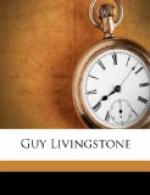He threw his bridle to Forrester, and, dismounting, cleared the brook at a bound. Then he went up to Kathleen, and began to coax her with voice and hand.
“I’ll bet an even fifty he takes her over the first time,” said Charley.
Bruce nodded his head, without speaking, to show that he took the bet. I thought he had the best of it, for the mare was so savage and sulky still that a refusal seemed a certainty.
Guy had mounted by this time, and, after taking a wide sweep in the field, came down at the brook. Kathleen was curling her back up, and going short, with the most evident intention of balking; but swerving was next to impossible, for she was fairly held in a vice by her rider’s hands and knees. The whip fell heavily twice on either shoulder, and, just at the water’s edge, Livingstone drove his heels in and lifted her. It was almost a standing leap, and, as Kathleen landed, a fragment of the bank went crashing into the water from under her hind hoofs, and she went down on her head; but Guy recovered her cleverly, and, turning again, sent her over it twice, backward and forward. The first time the mare did not try to refuse again, but rushed at it, snorting wrathfully, with her head in the air; the second she was quite tamed, and took it evenly in her stride.
“Give Mr. Bruce your horse, Harry, and take the Czar,” Guy said. “I’ll ride Kathleen home. Steady, old lady—don’t fret. We are friends again now.”
“So you have got your pony back,” I remarked to Forrester.
“Yes, and with interest,” was the quiet reply. “I don’t think he will owe me much when I have done with him.”
Though I had nothing on earth to do with it, I felt something like compunction as I guessed what he meant.
Bruce’s was a hard, money-loving nature, unromantic to a degree; but I believe he would gladly have waked to find himself a houseless, landless beggar, if he could thus have regained what Charley, with his soft voice, and eyes, and manner, had stolen from him long ago.
Am I right in saying “stolen?” Perhaps he never had it; at all events, he thought he had, which comes to nearly the same thing.
It is true that, unraveling the cord of a man’s existence, you will generally find the blackest hank in it twined by a woman’s hand, but it is not less common to trace the golden thread to the same spindle.
Great warrior, profound statesman, stanch champion of liberty as he was, without Edith of the Swan’s-neck, Harold would scarcely have risen into a hero of romance. We do not quite despise Charles VII. when we think how faithfully, in loneliness and ruin, the Lady of Beauty loved her apathetic, senseless, discrowned king. Others never found it out, but there must have been something precious hid in a dark corner of his wayward heart near which Agnes nestled so long. We look leniently on Otho—parasite and profligate—when we see him lingering on his last march, on the very verge of the death-struggle, in the teeth of Galba’s legions, to decorate Popaea’s grave. More in pity than in scorn, be sure, did Tacitus, the historic epigrammatist, write “Ne tum quidem veterum immemor amorum.”




